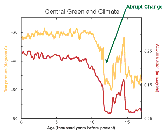 > English > Climate Encyclopaedia > Oceans > more > 1. Oceans and climate > - Oceans and climate change
> English > Climate Encyclopaedia > Oceans > more > 1. Oceans and climate > - Oceans and climate change
|
The OceansRead more |
Consequences of global warming on ocean circulationGlobal warming is likely to have a number of effects on the ocean. We know that carbon dioxide dissolves more easily in cold water than in warm water so warmer temperatures will reduce the ability of the oceans to take up carbon dioxide and this will further enhance the greenhouse effect. Higher temperatures are also predicted to increase the input of freshwater into the high latitude oceans. Computer models suggest that this additional freshwater comes from increased rain at mid and high latitudes and from the melting of ice sheets. Warmer temperatures also cause expansion of water and, along with the additional water from ice melt, will result in a rise in sea level and may cause flooding.
|
Trying to predict the impact of global warming requires use of complex computer models which all include assumptions about future conditions that cannot be tested properly. As a result, different models predict differing outcomes of global warming. Some models suggest that global warming will lead to a weakening of the thermohaline circulation during this century but that ocean circulation will not shut down completely, others show a complete breakdown of ocean circulation as a result of increased inputs of freshwater. It is difficult, therefore, to estimate how our climate would be if ocean circulation changed.
|
|
|
Complex models suggest a cooling of around 2 oC over most of Europe as a result of the reduced transport of heat from the Caribbean as the Gulf Stream weakens.
|
 |
|
3. This figure shows how air temperatures are predicted to change if the thermohaline circulation simply stopped. Most computer models suggest that temperatures in Europe would become colder as the Gulf Stream slowed down and less heat was brought from the Tropics to northern Europe. Courtesy of Michael Vellinga and Richard Wood and the CLIVAR Project. Click on the figure for a better view (11 KB). |
|
The impact of greenhouse gas induced warming has to be superimposed on this to give an overall prediction of climate. Over the world as a whole, temperatures are predicted to increase. Over Europe, however, most models suggest that temperatures would change little or that there would be a slight warming if the thermohaline circulation collapsed. Along with this slight warming, the climate is suggested to become wetter and more stormy. Predicting where and when these storms occur is really difficult. So we still need better observations and more realistic computer models to reduce our uncertainty about what will happen to our climate in the future.
About this page:author: Dr. Lucinda Spokes - Environmental Sciences, University of East Anglia, Norwich - U.K.
|


